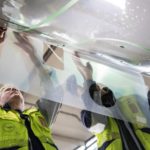The first ever net zero transatlantic flight will take off from the UK next year, with Virgin Atlantic receiving government funding to fly to the US using solely sustainable aviation fuel (SAF).
In 2023, one of Virgin Atlantic’s flagship Boeing 787s, powered by Rolls-Royce Trent 1000 engines, will take off from London Heathrow and make the journey to New York’s John F Kennedy Airport.
The flight is expected to be fuelled by SAF made primarily from waste oils and fats, such as used cooking oil. The use of 100 per cent SAF on the flight, combined with carbon removal through biochar credits – a material which traps and stores carbon taken from the atmosphere – will make the net zero flight.
Decarbonising aviation
Shai Weiss, Virgin Atlantic CEO, said: “As an airline founded on and committed to innovation, we’re proud to lead a cross industry consortium of partners to make aviation history by operating the first ever 100 per cent SAF flight across the Atlantic.
“Virgin Atlantic’s inaugural flight in 1984 was to New York and today it continues to be one of our most popular routes. It will be an honour to pave the way for this important business and leisure route to become even more sustainable.
“This challenge recognises the critical role that SAF has to play in decarbonising aviation and the urgent collective action needed to scale production and use of SAF globally.
“The research and results will be a huge step in fast tracking SAF use across the aviation industry and support the investment, collaboration and urgency needed to produce SAF at scale. Our collective ambition of Net Zero by 2050 depends on it.”
Jet Zero Strategy
Aviation is one of the hardest sectors to decarbonise and without urgent collaborative action it could be one of the highest emitting sectors for greenhouse gases by 2050.
To tackle this, the government published the Jet Zero Strategy in July 2022 which sets out our approach for decarbonising the sector and champions SAF as one of the main tools for achieving Jet Zero.
Challenges remain, however, including the need to scale up SAF production and the existing limit on how much SAF is permitted in jet engines by current fuel specifications.
Today, a maximum of 50 per cent SAF blended with kerosene can be used in commercial jet engines. By using 100 per cent SAF, the consortium will demonstrate the potential to decarbonise long-haul routes and bring us a step closer to net zero aviation.
‘Incredible milestone’
Rachael Everard, head of sustainability, Rolls-Royce said: “Congratulations to Virgin for winning the net zero transatlantic flight fund competition. This represents an incredible milestone for the entire aviation industry in its journey towards net zero carbon emissions.
“We are incredibly proud that our Trent 1000 engines will power the first ever flight using 100 per cent Sustainable Aviation Fuel (SAF) across the Atlantic. SAF will play such an important role in decarbonising long-haul flight in particular and is a key element of our sustainability strategy.
“The Trent 1000 can already be flown with a 50 per cent blend of SAF on commercial flights and by the end of 2023 we will have proven that our whole family of Trent engines and business aviation engines are compatible with 100 per cent SAF.”
Future of flight
Sheila Remes, Vice President, Environmental Sustainability, Boeing said: “Boeing is proud to support the Department for Transport and Virgin Atlantic in this endeavor. Our longstanding sustainability partnership with Virgin dates back to the historic 2008 commercial SAF test flight on a Boeing 747.
“Together, as we add another SAF ‘first’ to our partnership and to the benefit of the industry, we know we are one step closer to a sustainable future of flight that will have zero climate impact.”
Subscribe to the FINN weekly newsletter

